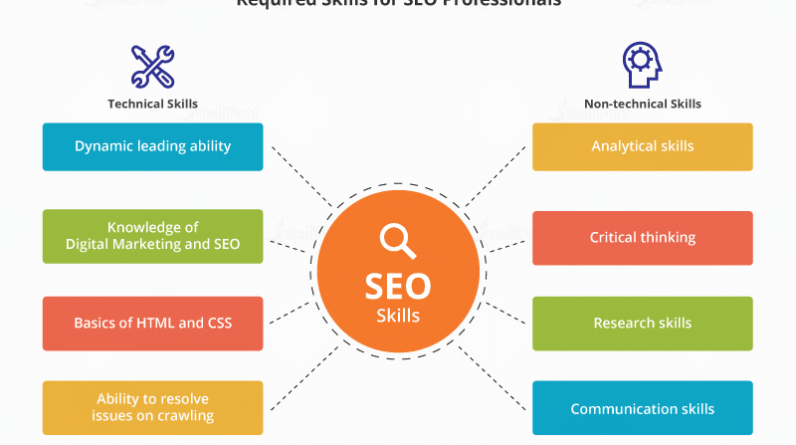Imagine you’re visiting a website on your mobile device and it takes forever to load, the text is tiny and unreadable, and you have to constantly zoom in and out to navigate. Frustrating, right? Well, this is a common experience for many users when it comes to business websites that are not optimized for mobile devices. In today’s digital age, where people rely heavily on their smartphones, having a mobile-friendly website is crucial for the success of any business. In this article, we will explore the importance of mobile SEO optimization for business websites and how it can significantly impact your online presence and customer engagement.
What is Mobile SEO Optimization?
Definition of Mobile SEO Optimization
Mobile SEO Optimization refers to the process of optimizing a website for mobile devices to improve its visibility and rankings on search engine results pages (SERPs). It involves making changes to the website’s design, content, and performance to ensure that it provides a seamless and user-friendly experience for mobile users.
Importance of Mobile SEO Optimization
In today’s digital age, the majority of internet users access websites and search for information using their mobile devices. As a result, businesses need to prioritize mobile SEO optimization to stay competitive and reach their target audience effectively. Mobile SEO optimization is crucial because:
-
Mobile traffic is on the rise: With the increasing popularity of smartphones and tablets, more and more people are using their mobile devices to browse the internet and search for products and services. By optimizing your website for mobile devices, you can tap into this growing market and attract a larger audience.
-
Enhanced user experience: Mobile SEO optimization ensures that your website is responsive and provides a seamless and enjoyable user experience on mobile devices. This includes factors such as easy navigation, readable text, and fast loading times. By providing a positive user experience, you can increase engagement and encourage visitors to spend more time on your site.
-
Higher search engine rankings: Search engines have recognized the importance of mobile-friendly websites and have adjusted their algorithms accordingly. Websites that are optimized for mobile devices tend to rank higher on SERPs, resulting in increased visibility and organic traffic. By optimizing your site for mobile, you can improve your chances of appearing at the top of search results and attracting more potential customers.
How Mobile SEO Optimization Works
Mobile SEO optimization involves implementing various strategies and techniques to ensure that your website is mobile-friendly and optimized for search engines. Some key aspects of mobile SEO optimization include:
-
Responsive web design: Creating a responsive website design is crucial for mobile SEO. This means designing your website to adapt and adjust automatically to different screen sizes and resolutions. A responsive design ensures that your website looks and functions well on a variety of mobile devices, providing a consistent and user-friendly experience.
-
Mobile-friendly content: Your website’s content should be optimized for mobile users. This includes using shorter paragraphs, concise headings, and visible call-to-action buttons. Mobile users have limited screen space, so it’s essential to ensure that your content is easy to read and navigate on smaller screens.
-
Page speed optimization: Mobile users expect fast-loading websites, and search engines prioritize websites that provide a smooth browsing experience. Optimizing your website’s loading speed is essential for mobile SEO. This can be achieved through techniques like compressing images, minimizing code, and leveraging browser caching.
By implementing these strategies and consistently monitoring the performance of your mobile website, you can improve its visibility, user experience, and search engine rankings.
Key Mobile SEO Strategies
Responsive Web Design
One of the most important mobile SEO strategies is implementing a responsive web design. This means creating a website that automatically adjusts its layout, content, and images based on the screen size and resolution of the device being used. Responsive design ensures that your website looks and functions well on different mobile devices, providing a consistent and user-friendly experience. With a responsive design, you don’t need to create a separate mobile version of your website, simplifying your maintenance and optimization efforts.
Mobile-Friendly Content
To optimize your website for mobile SEO, it’s essential to create mobile-friendly content. Mobile users have different browsing habits and preferences, so tailoring your content to their needs is crucial. Some best practices for mobile-friendly content include:
- Using concise and easily digestible paragraphs
- Breaking up content into shorter sections and paragraphs to improve readability
- Utilizing bullet points, numbered lists, and subheadings to organize information
- Ensuring that font size is readable on smaller screens
- Using high-quality images that load quickly on mobile devices
By optimizing your content for mobile users, you can provide a seamless reading experience and keep visitors engaged on your website.
Page Speed Optimization
Page speed optimization is an essential aspect of mobile SEO. Mobile users expect websites to load quickly, and search engines prioritize websites that provide a fast and smooth browsing experience. Slow-loading websites can lead to higher bounce rates, lower user engagement, and decreased search engine rankings. To optimize page speed for mobile devices:
- Compress images and optimize them for web viewing
- Minify CSS, HTML, and JavaScript code to reduce file size
- Leverage browser caching to enable faster loading on subsequent visits
- Reduce server response time by optimizing hosting and server configurations
- Use a content delivery network (CDN) to serve content from geographically closer servers
By optimizing your website’s page speed for mobile devices, you can significantly improve user experience and increase the chances of higher search engine rankings.
Benefits of Mobile SEO Optimization
Improved User Experience
Mobile SEO optimization plays a crucial role in enhancing the user experience for mobile visitors. By optimizing your website’s design, content, and performance for mobile devices, you can provide a seamless browsing experience that is easy to navigate, visually appealing, and quick to load. Positive user experiences lead to increased engagement, longer visit durations, and lower bounce rates, all of which contribute to higher rankings on search engine results pages.
Increased Organic Traffic
Optimizing your website for mobile devices can help increase organic traffic, as more and more users are searching for information and products on their smartphones and tablets. A mobile-friendly website has higher chances of appearing in mobile search results, leading to increased visibility and attracting potential customers. By reaching a wider audience and generating more organic traffic, you can grow your online presence and improve your chances of conversion.
Higher Conversion Rates
Mobile SEO optimization can also lead to higher conversion rates. A well-optimized mobile website that provides a seamless user experience encourages visitors to take desired actions, such as making a purchase, filling out a form, or contacting your business. When users find it easy and convenient to navigate your mobile site, without any impediments or frustrations, they are more likely to complete their desired actions, resulting in higher conversion rates and increased revenue for your business.
Mobile SEO vs Desktop SEO
Different Ranking Factors
Mobile SEO and desktop SEO have some similarities, but there are also key differences in the ranking factors that search engines consider. While both prioritize factors like relevant content, high-quality backlinks, and site speed, mobile SEO focuses more on aspects such as mobile-friendly design, page load speed, and user experience. Mobile websites that are optimized for mobile devices tend to rank higher in mobile search results, while desktop SEO focuses more on factors like site architecture and link authority.
Local Search & Mobile SEO
Mobile SEO optimization is especially crucial for local businesses that rely on local search traffic. When users search for local products or services on their mobile devices, search engines prioritize websites that are optimized for mobile devices and provide relevant local information. Mobile optimization ensures that your business appears in local search results, maps, and directories, improving your chances of attracting local customers and increasing foot traffic to your physical location.
Mobile-First Indexing
Google and other search engines have now transitioned to mobile-first indexing, which means they primarily use the mobile version of a website’s content for indexing and ranking. This shift further emphasizes the importance of mobile SEO optimization. Websites that provide a seamless and user-friendly experience on mobile devices have a higher chance of ranking well in search results. Mobile-first indexing ensures that search engine rankings align with the majority of users who access websites through mobile devices.
Mobile SEO Best Practices
Optimize for Voice Search
With the rise of voice assistants like Siri, Google Assistant, and Alexa, optimizing your website for voice search is essential. Voice search queries are often longer and conversational, and optimizing your content to match these queries can help improve your visibility and rankings in voice search results. Some best practices for optimizing for voice search include:
- Using natural language and long-tail keywords in your content
- Answering common questions related to your business or industry
- Creating FAQ pages to address specific queries users may have
- Structuring your content to provide concise, direct answers
- Utilizing schema markup to help search engines understand your content better
By optimizing your website for voice search, you can tap into this growing trend and attract more visitors to your site.
Utilize AMP (Accelerated Mobile Pages)
AMP, or Accelerated Mobile Pages, is an open-source framework that allows you to create web pages that load quickly on mobile devices. Implementing AMP can significantly improve your website’s performance and load times, providing a smoother user experience. AMP pages are designed to strip away unnecessary elements, scripts, and CSS, focusing on delivering a streamlined version of your content. By implementing AMP, you can ensure that your website meets the demands of mobile users who expect fast-loading pages.
Implement Structured Data Markup
Implementing structured data markup can help search engines better understand the content on your website and display relevant information in search results. Structured data markup provides additional context and structure to your content, making it easier for search engines to display rich snippets, such as ratings, reviews, and pricing information. By implementing structured data markup, you can increase the visibility and attractiveness of your website in search results, ultimately leading to higher click-through rates and improved organic traffic.
Impact of Mobile SEO on Local Businesses
Geolocation & Local SEO
Optimizing your website for mobile devices plays a significant role in local SEO for businesses with a physical location. Integrating geolocation features into your mobile website allows users to find your business easily and obtain relevant information such as address, phone number, and hours of operation. By optimizing for local search and incorporating geolocation, you can increase the visibility of your business in local search results and attract more foot traffic.
Mobile SERP Features
Mobile search engine results pages (SERPs) often differ from desktop SERPs in terms of layout and features. Mobile SERPs often display local packs, featured snippets, carousels, and other mobile-specific features. Optimizing your website for mobile SEO increases the likelihood of appearing in these mobile SERP features, increasing your visibility and attracting more organic traffic to your website. By understanding and optimizing for these mobile-specific features, you can ensure that your website stands out in mobile search results.
Mobile Advertising Strategies
Mobile SEO optimization also impacts mobile advertising strategies. By ensuring that your website is mobile-friendly and optimized for search engines, you can improve the effectiveness of your mobile advertising campaigns. Users who click on your mobile ads and visit your website are more likely to convert if they have a positive mobile user experience. A well-optimized mobile website can improve user engagement, keep visitors on your site longer, and increase the chances of conversions from your mobile advertising efforts.
Mobile SEO Tools & Resources
Google Mobile-Friendly Test
The Google Mobile-Friendly Test is a free tool provided by Google that allows you to test how well your website performs on mobile devices. Simply enter your website’s URL into the tool, and it will analyze your site and provide a report on its mobile-friendliness. The test highlights any issues that may affect your website’s performance on mobile devices and offers recommendations for improvement. This tool is an excellent resource for identifying areas that need optimization and ensuring that your website is mobile-friendly.
Google Search Console
Google Search Console is a powerful tool for monitoring your website’s performance in search results and identifying any issues or errors that may affect your mobile SEO efforts. It provides insights into how Google crawls and indexes your site and offers recommendations for improving your website’s visibility. The Mobile Usability report in Google Search Console highlights any mobile-related issues detected on your website, such as faulty redirects, viewport configuration problems, and content that is not accessible or usable on mobile devices.
Mobile SEO Blogs & Podcasts
Staying updated with the latest trends and best practices in mobile SEO is essential for optimizing your website effectively. There are several mobile SEO blogs and podcasts available that provide valuable insights and resources to help you stay informed. Some popular mobile SEO blogs and podcasts include MobileMoxie, Mobile Marketing Magazine, and The Mobile Marketing Show. Regularly following these sources can help you stay up-to-date with industry news, learn from experts, and enhance your mobile SEO knowledge.
Common Mobile SEO Mistakes to Avoid
Not Optimizing for Speed
One of the most common mobile SEO mistakes is neglecting to optimize your website for speed. Slow-loading websites frustrate users and lead to higher bounce rates and lower search engine rankings. Mobile users have even less patience for slow-loading pages than desktop users, so it’s crucial to prioritize page speed optimization. Ensure that your website is properly optimized, with compressed images, minimized code, and efficient server configurations. Regularly monitor your website’s performance and make any necessary optimizations to provide a fast and smooth user experience.
Unclear Call-to-Actions
Another common mobile SEO mistake is neglecting to provide clear and visible call-to-action buttons. Mobile users have limited screen space, and it’s important to make it easy for them to take the desired actions on your website. Use large, easy-to-tap buttons that are clearly visible on mobile screens. Optimize your call-to-action text to be concise and persuasive. Ensure that the call-to-action buttons are prominently placed and easily accessible on each page of your mobile website.
Ignoring Mobile SERP Features
Ignoring mobile SERP features is a mistake that can cost you valuable organic traffic. Mobile search engine results pages often display features such as local packs, rich snippets, and carousels, which provide additional visibility for your website. By optimizing your website for mobile SEO and understanding how these mobile SERP features work, you can increase your chances of appearing in these prominent positions and attract more organic traffic to your site.
Mobile SEO Trends and Future Outlook
Voice Search Domination
Voice search is a rapidly growing trend that is set to dominate the mobile search landscape. The advancements in voice recognition technology and the increasing popularity of voice assistants have made voice search a convenient and preferred method for accessing information. Businesses need to adapt their mobile SEO strategies to cater to voice search queries, focusing on long-tail keywords, natural language, and structured content that answers specific questions. Optimizing for voice search will become even more critical in the future as voice assistants continue to gain prominence.
Mobile-First Indexing Becomes Standard
With the shift to mobile-first indexing by search engines like Google, it is evident that mobile optimization will become the standard for websites. The majority of internet users are now accessing websites through their mobile devices, and search engines are adapting their algorithms to prioritize mobile-friendly websites. In the future, it will be crucial for businesses to ensure that their websites are not only mobile-friendly but also designed with a mobile-first approach. This means that businesses should prioritize their mobile users’ needs and create a seamless mobile experience as the primary focus.
Advancements in Mobile Technologies
As mobile technologies continue to advance, the impact of mobile SEO optimization will become even more significant. With the growing popularity of 5G networks, the proliferation of smartphones, and the emergence of new mobile devices and wearables, businesses will need to keep up with these advancements and adapt their mobile SEO strategies accordingly. The future will see an increased emphasis on augmented reality (AR), virtual reality (VR), and voice-controlled interfaces. Businesses that stay ahead of these evolving mobile technologies will have a competitive advantage in attracting and engaging mobile users.
Conclusion
Mobile SEO optimization is crucial for businesses in today’s mobile-driven world. By prioritizing mobile-friendly design, creating mobile-friendly content, and optimizing for mobile SERPs, businesses can improve user experience, increase organic traffic, and achieve higher conversion rates. With the rise of mobile devices and the growing popularity of voice search, businesses must stay updated with the latest mobile SEO strategies and trends to remain competitive in the digital landscape. By embracing mobile SEO optimization, businesses can reach a wider audience, enhance their online presence, and drive sustainable growth.







